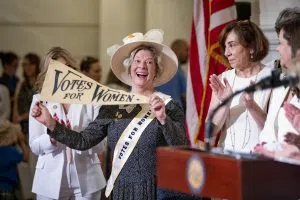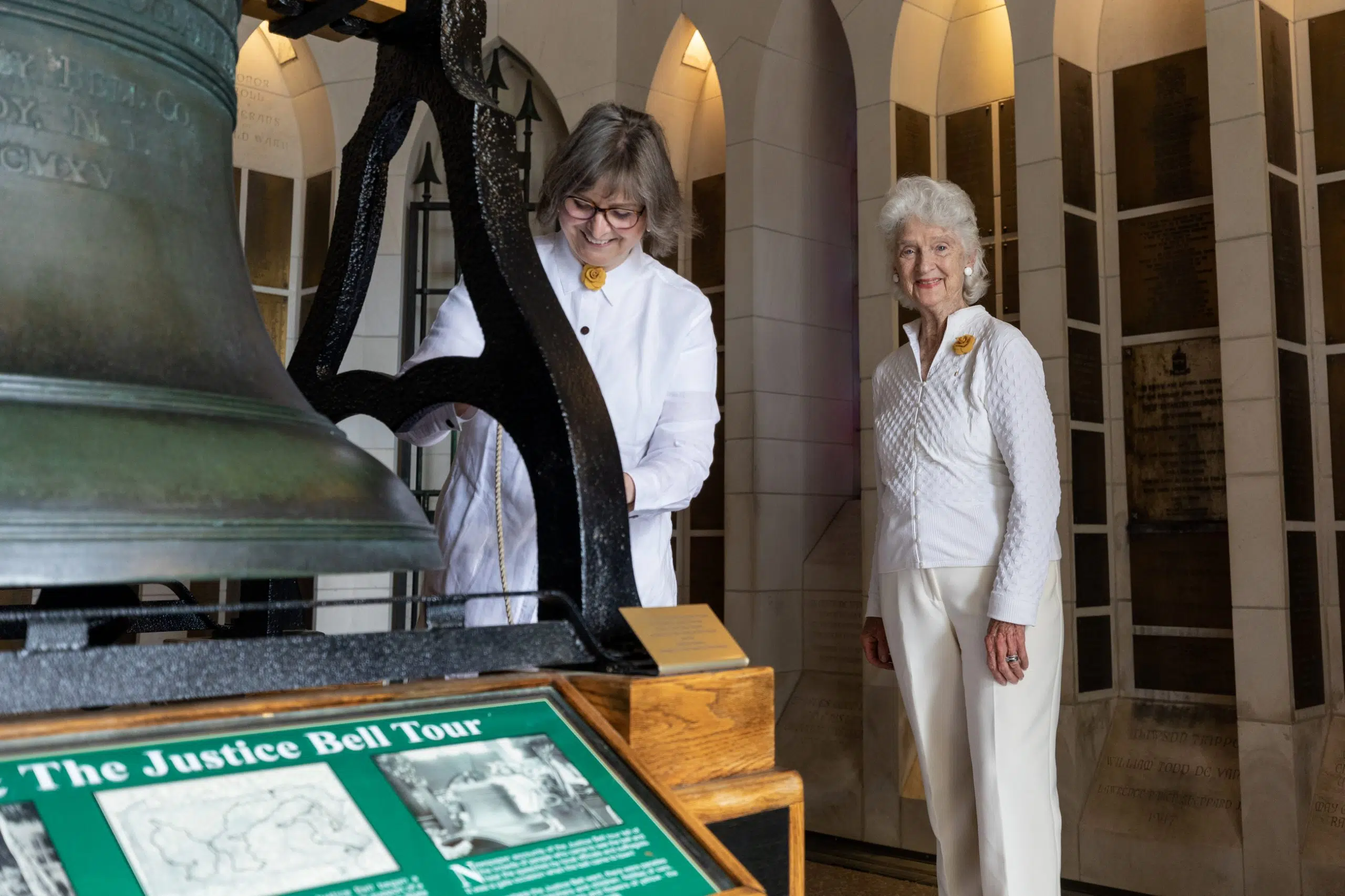King of Prussia, PA – Today, First Lady Frances Wolf commemorated the 100th anniversary of Pennsylvania’s ratification of the 19th Amendment giving women the right to vote by ringing the Justice Bell in Washington Memorial Hall in Valley Forge National Historical Park. The Justice Bell, a replica of the Liberty Bell, was created in 1915 to campaign for women’s suffrage across the nation.
The First Lady was joined by Alexandra “Sandy” Tatnall, a descendant of Katherine Wentworth Ruschenberger who commissioned the Justice Bell, and Maria Bomersbach, president of Washington Memorial Heritage Board of Directors and chair of Justice Bell 2020.
“It was an honor to ring the Justice Bell in recognition of the courageous suffragettes who led efforts in Pennsylvania and across the nation to give women the right to vote,” said First Lady Wolf. “These women stand as an example today of just how important it is for everyone to exercise the inalienable right to vote.”
The Pennsylvania General Assembly voted to provide women the right to vote on June 24, 1919. It became law nationally on August 26, 1920 after 36 states had ratified the 19th Amendment. Three-quarters of the states are required to ratify amendments to the U.S. Constitution; 48 states existed at the time.
The Justice Bell features the inscription, “Establish Justice. Proclaim liberty throughout all the land unto all the inhabitants thereof.” After production, the bell was mounted on the bed of a truck and taken to all of Pennsylvania’s 67 counties. Its clapper was chained, preventing the bell from ringing, to symbolize the silence of women who did not have the right to vote. The bell’s 5,000-mile road trip was designed to raise awareness for women’s suffrage in Pennsylvania.
In 1920, women took the bell on the road again, traveling to several states to raise support for the ratification of the 19th Amendment. After the 19th Amendment was ratified in August 1920, a celebration was held on the steps of Independence Hall in Philadelphia. The Justice Bell was rung 48 times – once for every state in the union.
A logo featuring the Justice Bell was created for organizations to use to mark all efforts to celebrate the centennial of women’s suffrage. The PA 100th Anniversary of Suffrage logo is available for download. The state also created pa.gov/women-vote to serve as the destination for learning more about the state’s women who were integral in the suffrage movement. The site also compiles a list of suffrage events statewide and tells the story of suffrage’s Quaker roots.
Women’s suffrage centennial events will take place across Pennsylvania through the anniversary of the 19th Amendment’s full ratification in 2020. Participants are encouraged to share photos using the #PAWomensSuffrage100 on social media to mark the occasion.
First Lady Wolf is also reminding Pennsylvanians to register to vote. She is encouraging eligible citizens to take advantage of the quick and convenient Online Voter Registration. The state’s OVR application can be found at register.votesPA.com.
For more information about the national centennial celebrations and history of women’s suffrage, visit pa.gov/women-vote, the PA Commission for Women, and Drexel University’s Vision 2020 National Women’s Equality Initiative.
~~~
Harrisburg, PA — Acting Secretary of State Kathy Boockvar joined officials and members of the public in the Capitol Rotunda to commemorate today’s 100th anniversary of the Pennsylvania General Assembly’s vote to ratify the 19thAmendment that would eventually give women the right to vote.
 “A century ago today, in this building, the commonwealth became the seventh state to ratify the 19th Amendment to the U.S. Constitution,” Secretary Boockvar said. “I am proud of Pennsylvania’s early embrace of women’s suffrage. We helped lead the way for the rest of the nation.”
“A century ago today, in this building, the commonwealth became the seventh state to ratify the 19th Amendment to the U.S. Constitution,” Secretary Boockvar said. “I am proud of Pennsylvania’s early embrace of women’s suffrage. We helped lead the way for the rest of the nation.”
Attendees shared in the celebration by “ratifying” copies of the amendment with their signatures. The General Assembly approved the amendment 20 days after it had cleared Congress on June 4, 1919, and was sent to the states for ratification.
On loan from the Pennsylvania State Archives, Pennsylvania’s original ratification document and other historical records from the suffrage movement were on display.
Secretary Boockvar was joined at the podium by guest speakers state Sen. Camera Bartolotta (R-46th), state Rep. Joanna McClinton (D-191st) and Lynn Yeakel, founder and president of the Vision 2020Opens In A New Window coalition.
“One hundred years ago, women in the United States – half the population – could not participate in our democracy as voting citizens. Next year, Vision 2020’s national Women 100 celebration will mark the historic milestone of the passage of the 19th Amendment to the U.S. Constitution, granting women the right to vote,” Yeakel said. “We will lead the nation with a year-long series of programs and events that honor the past, enrich the present, and shape the future to complete the unfinished business of women’s equality.”
Today’s anniversary event also served as a reminder of how women’s representation in government and leadership has evolved over the last century thanks to the 19th Amendment.
Currently, 65 women serve in the Pennsylvania General Assembly, 52 in the House and 13 in the Senate. Gov. Tom Wolf’s cabinet includes eight women. Last year, Pennsylvania made state history by sending four women to the U.S. House of Representatives.
The state recently launched a new website, pa.gov/women-vote, which offers a comprehensive guide to the Pennsylvania women and events that played an integral part in the state and national suffrage movement.
Lucretia Mott, a Philadelphian, was a nationally known abolitionist and suffragist whose views were shaped by her Quaker faith. Along with Elizabeth Cady Stanton, Mott helped organize the first women’s rights convention, held in Seneca Falls, N.Y., in 1848.
In the early 20th century, suffragists Caroline Katzenstein and Dora Kelly Lewis were leaders in the Pennsylvania suffrage movement and influential members of the National American Woman Suffrage Association and the National Woman’s Party.
Katzenstein served as secretary and publicist for several suffrage associations at the state and national level. Once women gained the right to vote in 1920, she dedicated the rest of her life to women’s labor rights.
Lewis often sacrificed her health and freedom for the cause. Between 1917 and 1919, she was arrested multiple times for involvement in pro-suffrage demonstrations. While imprisoned at the Occoquan Workhouse in Virginia, she was force-fed during a hunger strike she helped organize to protest the harsh treatment of the suffragists and was knocked unconscious by guards.
The 19th Amendment became law across the United States more than a year after Pennsylvania’s vote. In August 1920, the requirement that three-fourths of states ratify the amendment was finally attained with Tennessee’s vote. Eight days later – on August 26,1920 – U.S. Secretary of State Bainbridge Colby certified the 19th Amendment to the Constitution.


